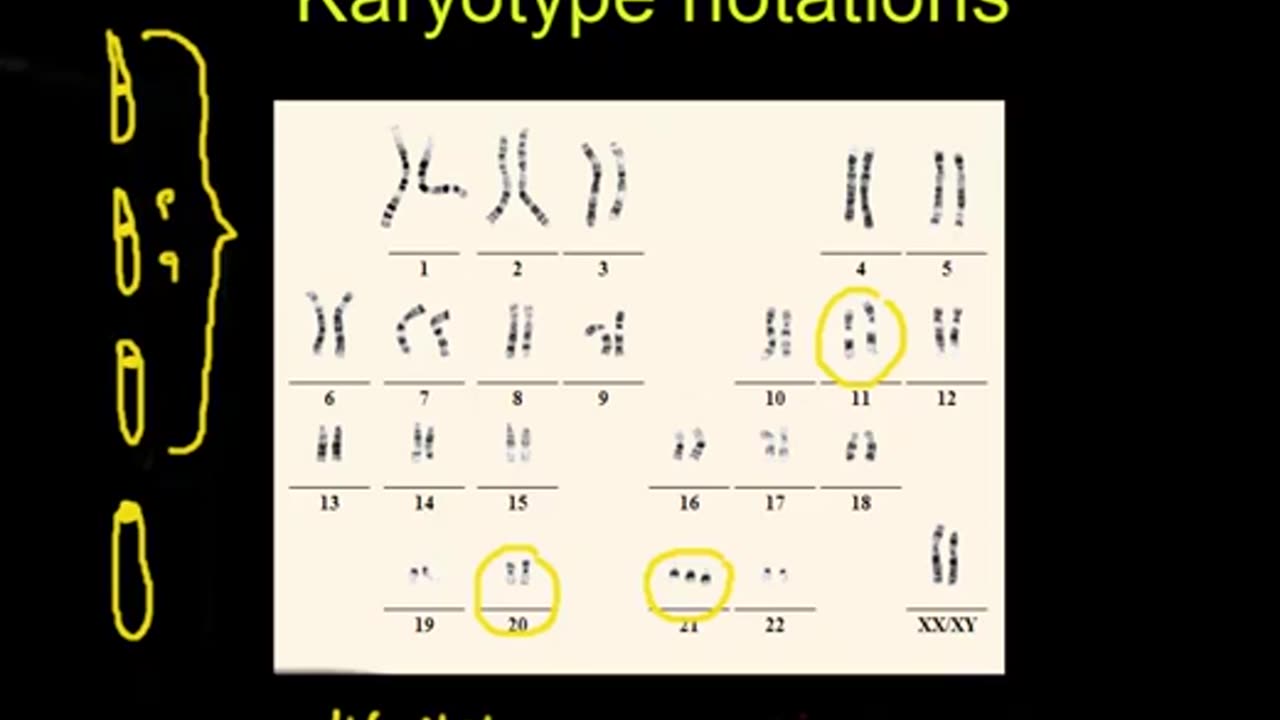Premium Only Content

Karyotype notations
A karyotype is the representation of the chromosomes of any type of cell. For humans, the information their chromosomes provide is crucial to learning about the genome and diagnosing genetic diseases. Newly married couples are encouraged to get karyotyped to see if their children may be at a higher risk of inheriting genetic diseases. The results of karyotypes are written in a special notation that, while it may look confusing at first, is actually easy to learn and understand.
Instructions
1
Count the number of pairs of chromosomes in the karyotype, except the sex chromosomes, the last two in the set. Write this number. In a normal human, the number will be 46.
2
Determine the sex chromosomes, whether they are "XX" or "XY." If they are "XX," the subject is a female; "XY," the subject is a male. Write this combination next to the number after a comma. In a normal woman, this will look like this "46, XX."
3
Note any irregularities in the karyotype. If the karyotype has an extra 21st chromosome, write "47, XX, +21, Trisomy-21," indicating the subject is a woman with 47 chromosomes and the extra chromosome is in the 21st pair. Having three chromosomes in a pair is called "Trisomy." If there is an extra sex chromosome, write 47, then the sex chromosomes; for example, "47, XXX."
Tips & Warnings
Consult a doctor or diagnostic manual to learn the names of disorders caused by chromosome irregularities, and write the disorder's name in the notation to make it more complete. For example, because an extra 21st chromosome is the cause of Down's syndrome, write the notation of the karyotype as "47, XY, +21,Trisomy-21, Down's Syndrome."
-
 LIVE
LIVE
ThePope_Live
3 hours agoLIVE - First time playing The Finals in over a YEAR! Still good? with @Arrowthorn
153 watching -
 3:06:26
3:06:26
TruthStream with Joe and Scott
9 hours agoRoundtable with Patriot Underground and News Treason Live 4/26 5pm pacific 8pm Eastern
31.8K23 -
 8:52
8:52
Tundra Tactical
7 hours ago $8.27 earnedSCOTUS Denies Appeal, Minnesota Courts Deal 2a Win!
38.3K8 -
 LIVE
LIVE
a12cat34dog
9 hours agoONE WITH THE DARK & SHADOWS :: The Elder Scrolls IV: Oblivion Remastered :: FIRST-TIME PLAYING {18+}
787 watching -
 22:27
22:27
Exploring With Nug
16 hours ago $12.16 earnedSwamp Yields a Chilling Discovery in 40-Year Search for Missing Man!
52.3K17 -
 1:23:26
1:23:26
RiftTV/Slightly Offensive
10 hours ago $10.96 earnedThe LUCRATIVE Side of Programming and the SECRETS of the "Tech Right" | Guest: Hunter Isaacson
61.9K16 -
 27:57
27:57
MYLUNCHBREAK CHANNEL PAGE
1 day agoDams Destroyed India
69.1K24 -
 LIVE
LIVE
Phyxicx
11 hours agoLast minute practice before Sunday - 4/26/2025
165 watching -
 LIVE
LIVE
The Official Steve Harvey
10 days ago $4.99 earned24 HOURS OF MOTIVATION w/ STEVE HARVEY
90 watching -
![Nintendo Switch It UP Saturdays with The Fellas: LIVE - Episode #16 [Clue]](https://1a-1791.com/video/fww1/eb/s8/1/L/3/n/F/L3nFy.0kob-small-Nintendo-Switch-It-UP-Satur.jpg) 4:36:25
4:36:25
MoFio23!
16 hours agoNintendo Switch It UP Saturdays with The Fellas: LIVE - Episode #16 [Clue]
25.8K3